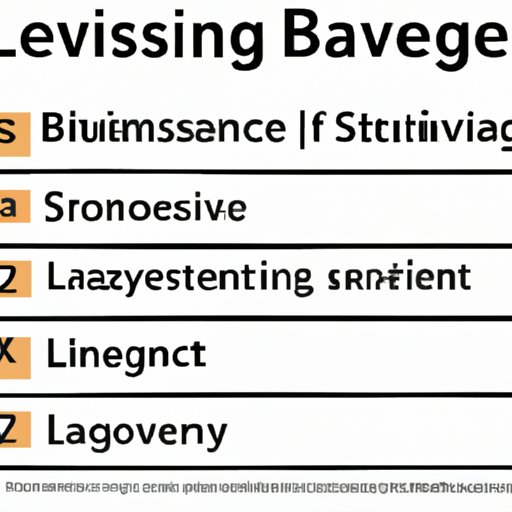Introduction
Business level strategy focuses on how a company will compete in a specific industry or market segment. It is a plan that outlines how a company will use its resources to achieve its goals and objectives, while taking into account internal and external factors. It is important for a company to have a business level strategy as it helps them to remain competitive and profitable in an ever-changing marketplace.

Overview of Business Level Strategy
Business level strategy involves developing a plan for how a company will differentiate itself from its competitors, create value for customers, and achieve its goals. There are several different types of business level strategies that companies can use, such as cost leadership, differentiation, and focus/niche strategies. Each type of strategy has its own advantages and disadvantages that must be taken into consideration when deciding which one to use.
How to Implement a Successful Business Level Strategy
Implementing a successful business level strategy requires careful planning and analysis. The first step is to identify the company’s goals and objectives. This will provide a clear direction for the strategy and make sure that everyone involved is working towards the same end. Once the goals and objectives have been identified, the next step is to analyze the internal and external factors that may affect the success of the strategy. This includes looking at the competition, the customer base, and the economic environment. After the analysis is complete, the appropriate strategy can be selected and an action plan developed.
Examples of Effective Business Level Strategies
Cost leadership is a business level strategy that focuses on reducing costs and increasing efficiency. Companies that use this strategy aim to produce goods and services at a lower cost than their competitors. This enables them to offer lower prices and gain a competitive advantage in the marketplace. Differentiation is another common business level strategy that involves creating unique products and services that appeal to a specific customer segment. Companies that use this strategy aim to stand out from the competition by providing something that others cannot.
Focus/niche strategies involve focusing on a specific customer segment or geographic area. Companies that use this strategy aim to become the dominant player in a particular market segment by offering tailored products and services. This strategy allows companies to better meet the needs of their target customers and gain a competitive advantage.

Benefits of Developing a Business Level Strategy
Developing a business level strategy can provide many benefits to a company. It can help to improve performance by giving the company a clear direction and purpose. It can also increase efficiency and profitability by allowing the company to focus its resources on activities that will give the best return on investment. Additionally, having an effective business level strategy can give a company a greater competitive advantage over its rivals.
A survey by McKinsey & Company found that companies with a well-defined strategy outperformed those without one by 20%. The study also found that companies with a strong strategy were more likely to be agile, have higher returns on capital, and be more resilient in times of crisis.

Challenges Faced When Developing a Business Level Strategy
Although there are many benefits to developing a business level strategy, there are also some challenges that must be faced. One of the biggest challenges is the complexity of implementation. Developing a strategy is not easy and requires a lot of time and effort. Additionally, companies often lack the resources and expertise needed to develop and implement an effective strategy. Finally, changes in market conditions can make it difficult to maintain a successful strategy.
Conclusion
Business level strategy is an essential part of any company’s success. It provides a clear direction and purpose, and helps to ensure that a company remains competitive and profitable. It is important to take into account both the advantages and challenges of developing a business level strategy, and to select the right strategy for the company’s goals and objectives. With careful planning and analysis, a business level strategy can be implemented successfully and bring many benefits to a company.
(Note: Is this article not meeting your expectations? Do you have knowledge or insights to share? Unlock new opportunities and expand your reach by joining our authors team. Click Registration to join us and share your expertise with our readers.)
